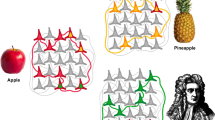Abstract
At a symbolic level cognition can be modelled as a production system where meaning units are represented as condition-action rules. Anderson (1982, 1987) provides a good example of how learning can occur with this type of knowledge representation. At a subsymbolic level cognition can be modelled with a connectionist network where meaning units are represented as patterns of parallel distributed activity. The work of the McClelland and Rumelhart (1986) group is a prototype of this approach. We elaborate on these two approaches to learning and contrast the symbolic search space paradigm with the connectionist paradigm.
Similar content being viewed by others
References
Anderson, J. R. (1982) Acquisition of cognitive skill. Psychology Review, 89, 369–406.
Anderson, J. R. (1986) Knowledge compilation: The general learning mechanism. In Machine Learning II (eds R. S.Michalski, J. G.Carbonell & T. M.Mitchell) pp. 289–310. Morgan Kaufmann, Palo Alto, CA, USA.
Anderson, J. R. (1987) Skill acquisition: Compilation of weak-method problem solutions. Psychology Reviews, 94, 192–210.
Barsalou, L. W. (1983) Ad hoc categories. Memory and Cognition, 11, 211–227.
Brown, R. (1973) A First Language: The Early Stages, MIT Press, Cambridge, MA, USA.
Chi, M. T. H., Feltovich, P. J. & Glaser, R. (1981) Categorization and representation of physics problems by experts and novices. Cognitive Science, 5, 121–152.
Chomsky, N. (1980) Rules and representations. Behavioural and Brain Sciences, 3, 1–16.
Coltheart, M. (1981) Disorders of reading and their implications for models of normal reading. Visible Language, 15, 245–286.
Cooke, N. M. & McDonald, J. E. (1987) The application of psychological scaling techniques to knowledge elicitation for knowledge-based systems. International Journal of Man-Machine Studies, 26, 533–550.
Davis, R. & Lenat, D. B. (1982) Knowledge-Based Systems in AI, McGraw-Hill, NY, USA.
Haas, N. & Hendrix, G. G. (1983) Learning by being told: acquiring knowledge for information management. In Machine Learning I (eds R. S.Michalski, J. G.Carbonell & T. M.Mitchell) pp. 405–407 Morgan Kaufmann, Los Altos, CA, USA.
Hayes-Roth, F., Waterman, D. & Lenat, D. B. (1983) Building Expert Systems, Addison-Wesley, Reading, Mass., USA.
Hendrix, G. G., Sacerdoti, E. D., Sagalowicz, D. S. & Slocum, J. (1978) Developing a natural language interface to complex data. ACM Transactions on Database Systems, 3, 105–147.
Hilgard, E. R. & Bower, G. H. (1966) Theories of Learning 3rd edn, Appleton-Century-Crofts, New York, USA.
Hinton, G. E. (1986) Learning in massively parallel nets. Proceedings of the AAAI-86, Philadelphia.
Holland, J. H. (1986) Escaping Brittleness: the possibilities of general purpose learning algorithms applied to parallel rule-based systems. In Machine Learning II (eds R. S.Michalski, J. G.Carbonell & T. M.Mitchell) pp. 593–623. Morgan Kaufmann, Los Altos, CA, USA.
Johnson, P. E. (1983) What kind of expert should a system be? The Journal of Medicine and Philosophy, 8, 77–97.
Langley, P. (1983) Learning search strategies through discrimination. International Journal of Man-Machine Studies, 19, 512–541
Langley, P. & Simon, H. A. (1981) The central role of learning in cognition. In Cognitive Skills and their Acquisition (ed. J. R.Anderson) Erlbaum, New Jersey, USA.
Martin, D. W. (1986) Learning-by-doing versus fully-informing as training strategies. Proceedings of the Human Factors Society 30th Annual Meeting, Dayton, OH, USA.
McCarthy, J. (1968) Programs with common sense. In Semantic Information Processing (ed. M.Minsky) pp. 403–418. MIT Press, Cambridge, MA, USA.
McClelland, J. & Rumelhart, D. E. (1986) Parallel Distributed Processing, Vol. 2, MIT Press, Cambridge MA, USA.
McKendree J. & Anderson J. R. (1988) Frequency and practice in the composition of knowledge in LISP evaluation. In Cognitive aspects of Human-Computer Interaction (ed. J. M. Carroll) (in press).
Michie, D. (1968) ‘Memo’ functions and machine learning. Nature, 218, 19–22.
Mostow, J. (1983) Machine transformation of advice into a heuristic search procedure. In Machine learning I (eds R. S.Michalski, J. G.Carbonell & T. M.Mitchell) pp. 367–403. Morgan Kaufmann, Los Altos, CA, USA.
Murphy, G. L. & Medin, D. L. (1985) The role of theories in conceptual coherence. Psychology Review, 92, 289–316.
Neves, D. M. & Anderson, J. R. (1981) Knowledge compilation: Mechanisms for the automization of cognitive skills. In Cognitive Skills and Their Acquisition (ed. J. R.Anderson) pp. 57–84. Erlbaum, Hillsdale, NJ, USA.
Paap, K. R., McDonald, J. E., Schvaneveldt, R. E. & Noel, R. W. (1987) Frequency and pronounceability in visually presented naming and lexical-decision tasks. In Attention and Performance XII (ed. M.Coltheart) Erlbaum, Hillsdale, NJ, USA.
Partridge, D. (1975) A dynamic database that automatically removes unwanted generalisation. Computer Journal, 18, 43–48.
Partridge, D. (1986) Artificial Intelligence: Applications in the Future of Software Engineering. Ellis Horwood/Wiley, Chichester.
Partridge, D. (1987) The scope and limitation of first generation expert systems technology. Future Generation Computer Systems, 3, 1.
Pirolli, P. L. & Anderson, J. R. (1985) The role of learning from examples in the acquisition of recursive programming skill. Canadian Journal of Psychology, 39, 240–272.
Quinlan, J. R. (1982) Semi-autonomous acquisition of pattern-based knowledge. In Introductory Readings in Expert Systems (ed. D.Michie), pp. 192–207. Gordon & Breach, London.
Rumelhart, D. E., Hinton, G. E. & Williams, R. J. (1986) Learning internal representations by error propagation. In Parallel Distributed Systems (eds D. E.Rumelhart & J. E.McClelland) Vol. I, pp. 318–362. MIT Press, Cambridge, MA, USA.
Rumelhart, D. E. & McClelland, J. E. (1986) Parallel Distributed Systems, MIT Press, Cambridge, MA, USA.
Schank, R. C. & Abelson, R. (1977) Scripts, Plants, Goals, and Understanding, Erlbaum, NJ, USA.
Simon, H.A. (1983) Why should machines learn? In Machine Learning I (eds R. S.Michalski, J. G. Carbonell & T. M.Mitchell) pp. 25–37. Morgan Kaufmann, Los Altos, CA, USA.
Sejnowski, T. J. & Rosenberg, C. R. (1986) NETtalk: a parallel network that learns to read aloud. Technical Report JHU/EECS-86/01, Department of E.E. & C.S., Johns Hopkins University, USA.
Steels, L. (1985) Second generation expert systems. Future Generation Computer Systems, 1, 213–221.
Thorndike, E. L. (1903) Educational Psychology, Lemcke & Buechner, New York, USA.
Winston, P. H. (1975) Learning structural descriptions from examples. In The Psychology of Computer Vision (ed. P. H.Winston) pp. 157–209. McGraw-Hill, NY, USA.
Author information
Authors and Affiliations
Rights and permissions
About this article
Cite this article
Partridge, D., Paap, K. An introduction to learning. Artif Intell Rev 2, 79–101 (1988). https://doi.org/10.1007/BF00140398
Issue Date:
DOI: https://doi.org/10.1007/BF00140398




